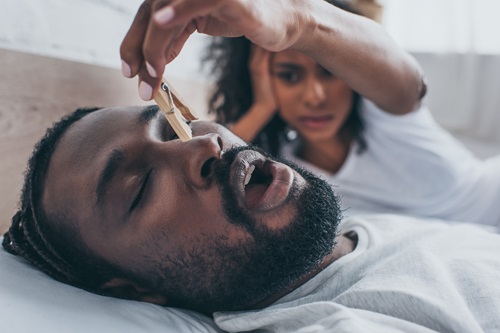The Role of Sleep Apnoea Mouthguards in Treating Bruxism

When we talk about sleep-related problems, we tend not to notice them unless we sleep with someone in the same room. So, when the person who has specific symptoms is not aware of it, they may also not be aware of the problem they have.
One of the things many people are not aware of is if they grind their teeth during sleep. While it may sound like a simple problem, it can actually lead to worst-case scenarios.
Bruxism is the scientific term for teeth grinding that can cause different dental issues, from worn-down teeth to jaw pain. If left untreated, it can lead to more severe problems, including damage to the teeth and gums. For many people who are already aware of this, managing bruxism is essential to protecting their oral health and overall well-being.
Let’s explore how sleep apnoea mouthguards work for patients with bruxism, and how they can help in treating teeth grinding effectively.
Understanding Bruxism
What is Bruxism?
Let’s start by understanding first what bruxism is. Bruxism is a sleep disorder that involves the grinding or clenching of teeth typically while a person is asleep. While occasional teeth grinding may not be harmful, frequent or severe bruxism can cause significant damage to your teeth and jaw. It can also lead to discomfort, including:
- Headaches
- Jaw soreness or stiffness
- Sensitive teeth
- Damage to dental restorations (e.g., fillings, crowns)
- Sleep disturbances
The exact causes of bruxism aren’t always clear, but it’s often linked to stress, anxiety, a person’s genes, alcohol or caffeine consumption, smoking, and specific medications that can also affect their sleep. or sleep disorders such as sleep apnoea.
How Sleep Apnoea Mouthguards Work
Sleep apnoea mouthguards, or mandibular advancement devices (MADs), are oral appliances that help reposition the jaw during sleep. This makes the airway open so sleep apnoeas don’t occur.
Moving the lower jaw forward with these devices helps prevent the muscles from collapsing on the airway and reduces the symptoms of sleep apnoea, such as snoring and pauses in breathing.
Now, how are these sleep apnoea mouthguards helpful for patients with bruxism? Can mouthguards help in treating bruxism?
Actually, yes!
These mouthguards not only help with sleep apnoea but with bruxism as well. But how? Bruxism mouthguards, or night guards, are designed to protect your teeth from grinding.
Sleep apnoea mouthguards, on the other hand, not only help maintain an open airway but also keep the jaw in a forward position to prevent breathing pauses. At the same time, this placement can prevent teeth from grinding with each other.
Here are some other ways that sleep apnoea mouthguards can help in treating bruxism:
1. Jaw Positioning
Repositioning the lower jaw with mouthguards can prevent overactivity of the jaw muscles that occurs during teeth grinding. This can help reduce the frequency and severity of bruxism episodes.
2. Protecting Teeth
Like traditional mouthguards, sleep apnoea mouthguards provide a barrier between the upper and lower teeth, reducing the damage caused by grinding. This protection helps prevent excessive wear and tear on your teeth and dental work.
3. Improving Sleep Quality
One of the key benefits of treating both sleep apnoea and bruxism with a mouthguard is the improvement in sleep quality. When your breathing is stabilised and your jaw is positioned correctly, you are less likely to experience sleep disruptions. Better sleep can reduce stress and anxiety, which are two factors that typically contribute to bruxism.
Choosing the Right Mouthguard for Bruxism and Sleep Apnoea
Mouthguards are now available over-the-counter and at your dentist’s office.
But here’s what each of these are:
- Custom-Fitted Mouthguards: These are moulded to your teeth and provide a perfect fit. While they may cost more than over-the-counter options, they offer better protection and comfort, making them an ideal choice for long-term use.
- Over-the-Counter Mouthguards: These are pre-made and available at most pharmacies. While they are more affordable, they may not fit as well and can cause discomfort or irritation.
When it comes to treating bruxism and sleep apnoea simultaneously, what we can advise is to work with your dentist to find the best solution. While over-the-counter mouthguards are easily available, custom-fitted mouthguards are still highly recommended because they are designed to fit and hug your mouth perfectly.
This will ensure you can enjoy your sleep well without any worries about your mouthguard falling from its place.
Is a Mouthguard Right for You?
If you experience sleep apnoea, bruxism, or both, a mouthguard could be the solution you’re looking for to manage those issues. Not only can a mouthguard improve your breathing during sleep, but it can also protect your teeth from the damaging effects of grinding or clenching.
However, it’s essential to have a thorough assessment with your dentist to ensure that a mouthguard is the right option for your needs. Your dentist can create a custom-fitted device that addresses both your sleep apnoea and bruxism, ensuring that you sleep soundly and wake up with healthier teeth.
So, if you’re struggling with bruxism or if you’re interested in learning more about it, our dentists at Blue Gum Dental are here to help. We offer custom-fitted dental appliances that can make sure your needs are met while your oral health is at its optimal state.
Book a consultation today to find out how we can help you sleep better while also protecting your smile and oral health!
